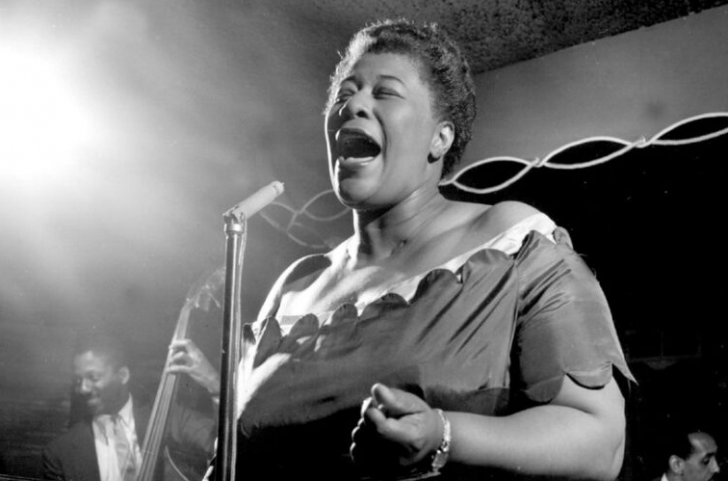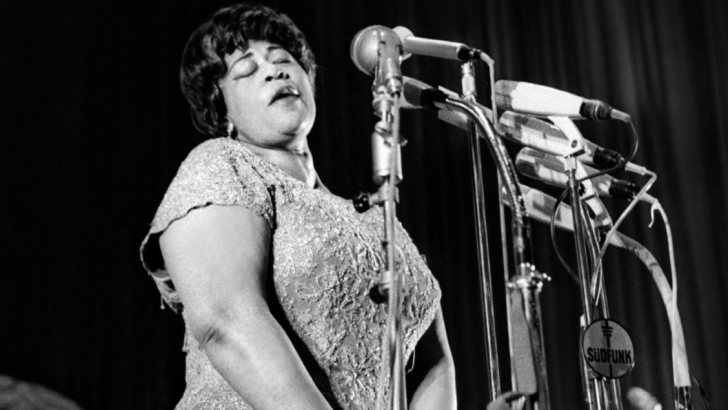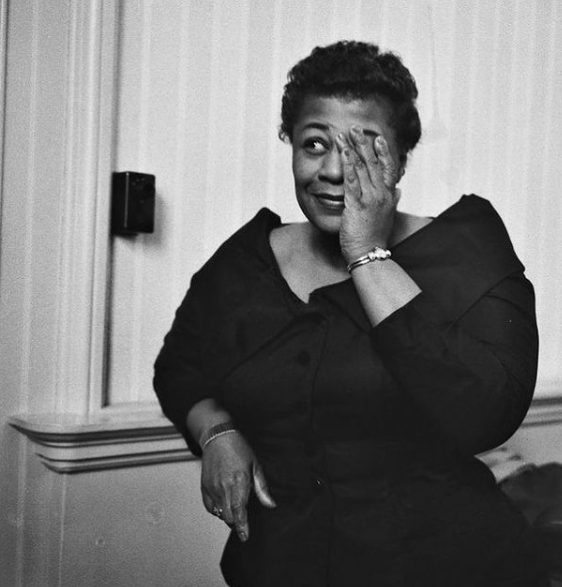The hardest part of enjoying old jazz music—or any old music, really—is coming to terms with the fact that the most prominent, beloved artists of the past will never release new music. There will never be another excited wait for a new album, and there are no new interviews to read or watch on TV, no new concert tours to attend, and not even a new Memorex advertisement to catch a glimpse of in a magazine.
However, while the chances of receiving new music from a late artist are slim, they are never truly zero. Fans of Ella Fitzgerald were pleasantly surprised last year, when Verve Records announced that her already extensive catalog of music would be expanding yet again. Several compilation albums and remastered editions have been produced since her passing in 1996. This release was particularly unusual, however, because the recordings on the album had never been heard by the public.

Ella: The Lost Berlin Tapes is a live album that was recently unearthed in Verve founder Norman Granz’s personal archives. Granz became Fitzgerald’s manager in the mid-1940’s, and essentially created Verve around her. Though many other jazz greats signed on in later years, Fitzgerald was always a central figure for the label, and she has remained as such even decades after her death.
Verve’s current vice president, Ken Druker, along with drummer and producer Gregg Field (who performed with Fitzgerald in the 1980’s), discovered Ella: The Lost Berlin Tapes on a reel-to-reel that had been stashed away in a box, presumably by Granz himself. Although it’s unclear why the tape had never been released—Field has suggested that it may have been due to a music copyright issue—the two men were able to beautifully remaster and release it nearly sixty years after it had been recorded.
Ella: The Lost Berlin Tapes is the newest member in a series of iconic live albums from Fitzgerald—all of which were recorded in Berlin. The first, and most famous of the trio, is Ella in Berlin: Mack the Knife, which was recorded in 1960. She dazzled the crowd at the Deutschlandhalle with a well-executed lineup of jazz standards, though two tracks in particular stand apart from the rest of the album. In the titular “Mack The Knife,” she forgets the lyrics. As a seasoned improvisor, however, she recovers flawlessly, and invents some entertaining new lyrics of her own. In the finale of “How High The Moon,” she produces what many jazz enthusiasts consider to be the greatest scat solo of all time. She nimbly weaves between improvisation and song references, and all at a breakneck tempo. The album was so popular, it netted her one Grammy for Best Vocal Performance Album, and another one specifically for the song “Mack The Knife,” as Best Vocal Performance Single Track.
After Ella in Berlin: Mack the Knife, Fitzgerald performed in Berlin again the following year, and recorded another live album. Ella Returns to Berlin was recorded in 1961, but much like Lost Berlin Tapes, it was not shared with the public until much later. In 1991, exactly thirty years after it had been recorded, the album was released for the very first time. Though it did not receive as much attention as Ella in Berlin: Mack the Knife, Ella Returns to Berlin is by no means a forgettable album. The concert that year was yet another tight hour of wonderful singing from Fitzgerald. The album also preserves more of the “in-between” moments that often get cut out of recordings of live performances. The introduction of the band members, the raucous applause when Fitzgerald takes the stage, and the brief “Fanfare for Ella” interludes reinforce a genuine concert experience, even for listeners in the 21st century. At the end, there is even an appearance (and excellent piano solo) by Oscar Peterson and his trio, for the finale of “This Can’t Be Love.” When the applause finally dies on the “Closing Announcements” track, there is a prophetic wish from Norman Granz: “We hope very much on behalf of the Oscar Peterson Trio, the Lou Levy Quartet, and Ms. Fitzgerald that you enjoyed the concert,” he says, “and we’re hoping to tour again in 1962.” The applause is nearly deafening.

The 2020 release of Ella: The Lost Berlin Tapes proves that lightning can strike three times in the same place. Reunited with pianist Paul Smith and bassist Wilfred Middlebrooks (the latter of whom is the only band member to appear on all three albums), Fitzgerald showcases her effortless charm and skill as a vocalist.
In some instances, she changes the lyrics to make a well-known song her own. “My Kind Of Boy” is a swinging, gender-swapped take on “My Kind Of Girl,” but with some of the more inane, “eyes like an angel’s eyes” lines substituted with references to prominent jazz musicians, like Count Basie and Frank Sinatra. Similarly, Ray Charles’ “Hallelujah I Love Her So” becomes “Hallelujah I Love Him So,” and is given a very pretty, hymn-like introduction from the piano. “Is this in my act?” Fitzgerald jokes, but when the band slips into swing again, she delivers the tune masterfully.
The album also features some slower tempo tunes, which become powerhouses in Fitzgerald’s capable hands. “Cry Me A River,” “Someone To Watch Over Me” and the deep, mysterious “Angel Eyes” are each fantastic. After yet another energetic performance of “Mack The Knife,” it seems almost impossible for her to outdo herself for the finale. As she finally pauses for a moment, the band introduces a slow blues tune. “You can take it now, I’m finished,” she jokes breathlessly to them. “Go ahead, have a ball!” Yet within seconds, she is singing again. “Wee Baby Blues” is considerably more laid-back than the other Berlin albums’ finales, but it is just as powerful.

Like siblings, the three Berlin performances are separated by a few short years, but share many similarities. Apart from being recorded in the same city, each album serves as a testament to Fitzgerald’s inexhaustible vigor as a vocalist. The 1950’s and ’60’s were the golden years of Ella, and she was at the height of her skill and stamina as a live performer. At just around an hour each, the three performances segue from song to song, with only a brief moment for applause in between. Within the songs themselves, too, she seems to have almost relentless energy. No matter how fast a tempo, no matter how many tunes she just performed back-to-back, she consistently delivers a one-two punch of rhythmic accuracy and gorgeous diction.
She also takes the opportunity of the live albums to showcase some of her standard studio repertoire in a performance setting. By the time of the Berlin tours, her discography was already extensive, in part due to her famous Song Book series. From the official foundation of Verve in 1956 to about 1964, Fitzgerald recorded a series of albums to honor eight different Great American Songbook composers, which became collectively known as the Ella Fitzgerald Song Books. The series was being released around the time of the Berlin concerts, and accordingly, many of the tunes on the albums were members. Other songs, like “Cheek To Cheek,” and “Summertime,” would have been well-known to her fans from her duet albums with Louis Armstrong—but in Berlin, they were all hers. Duet or solo, studio or live, famous composer or not, she made every song she performed uniquely her own.
Though she primarily drew public attention for her vocal skills, Fitzgerald’s keen ability to connect with an audience was crucial, and it was on full display throughout the Berlin concerts. Though she was notoriously shy, her quiet wit seems to have been just as sharp as her singing talents. Occasionally, her listeners are allowed a glimpse into her tongue-in-cheek, and at times, self-deprecating sense of humor. There are dozens of these little moments—from her bantering Louis Armstrong impression in each of the “Mack The Knife” recordings, to her somewhat indignant “mournful?” after singing the word in Ella: The Lost Berlin Tapes’ “Mr. Paganini.” Each little aside, each coy remark draws laughter and applause from the adoring crowd. Sometimes, Fitzgerald laughs right along with them. In these moments, her down-to-earth grace shines just as brightly to her listeners as her superstar status as a vocalist.
In an interview with New Jersey jazz radio station WGBO, Druker hinted that they may have discovered more unreleased albums in the archives. If this is indeed true, it’s quite possible that Fitzgerald’s modern-day fanbase is in for yet another special release of “new” music. In typical Ella Fitzgerald fashion, lightning could certainly strike again.
